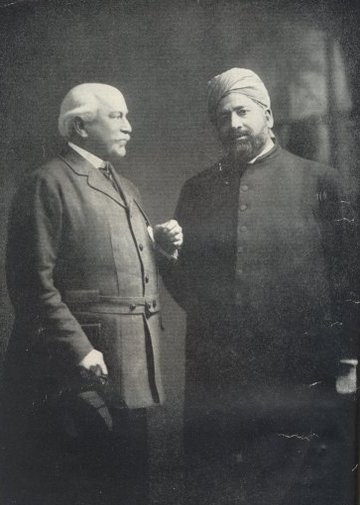
Khwaja Kamaluddin
‐
Lawyer who was an important figure in the Ahmadiyya movement
Other names
Khwaja Kamal-ud-Din
Place of birth
Date of arrival to Britain
Location(s)
149 Oriental Road
Woking
GU22 7AN
United Kingdom
About
Grandson of the poet and judge Khwaja Abdur Rasheed, eminent lawyer and Islamic scholar Khwaja Kamaluddin was born in Punjab in 1870. In 1893 he graduated from Forman Christian College in Lahore where he was drawn to Christianity before becoming inspired by the writings of the founder of the Ahmadiyya movement. Kamaluddin worked as a lecturer and then as Principal of Islamia College, Lahore; in 1898 he graduated in law and started a legal practice in Peshawar. He wrote extensively on Islam and delivered lectures across the Indian subcontinent, also raising funds for Aligarh University.
Kamaluddin travelled to Britain in 1912 to pursue a legal case on behalf of a client. He settled in Kingston and gave his first British public talk on Islam at Speaker's Corner, Hyde Park. Soon afterwards he took control of the Shah Jahan Mosque in Woking with the support of Syed Ameer Ali, Sir Abbas Ali Beg and Sir Thomas Arnold. He established the Woking Muslim Mission and Literary Trust there, as well as the journal The Islamic Review (1913–67) through which he and other contributors sought to counter misconceptions about Islam among the British. During his time in Britain, he delivered several lectures, including at Cambridge University and the Lyceum Club, on topics such as the comparative merits of Islam and Christianity and the position of women in Islam. He also oversaw several conversions at the Shah Jahan Mosque.
In 1914 Kamaluddin returned to India, remaining there for two years then travelling between India and Britain for the next few years. Throughout this time he remained concerned with the problems faced by Muslims in India as well as with perceptions of Islam in Britain. He was elected member of the League of Nations Union in 1923, the same year that he performed hajj with the convert Lord Headley. He died in 1922.
Syed Ameer Ali, Sir Mirza Abbas Ali Beg (Muslim advisory member of the Council of the Secretary State for India), Sir Thomas Arnold, Lord Headley, Gottlieb Leitner.
The Ideal Prophet (Woking: The Basheer Muslim Library, 1925)
Sources of Christianity (Woking: The Basheer Muslim Library, 1924)
Islam to East and West (Woking: The Basheer Muslim Library, 1935)
Jesus and Traditional Christianity (Woking: The Woking Muslim Mission and Literary Trust, 1920)
Running Commentary on the Qur'an (Woking: The Woking Muslim Mission and Literary Trust, 1928)
Islam My Only Choice (Woking: The Islamic Review, 1929)
Ahmad, Nasir, Eid Sermons at the Shah Jahan Mosque, Woking, England, 1931–1940 (Lahore: Aftab-ud-Din Memorial Benevolent Trust, n.d.)
Salamat, Muslim, P., A Miracle in Woking: A History of the Shahjahan Mosque (Chichester: Phillimore & Co., 2008)
The Islamic Review, 1913–67
Image credit
Lord Headley with Khwaja Kamal-ud-Din, date unknown
Public domain, via Wikimedia Commons
